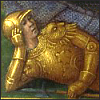Take a photo of a barcode or cover
This book took me for quite a spin. I enjoyed how the story truly brought to life the realities of living in the countryside of Japan during the early 1900s. The titular, NonNonBa was a wonderful presence throughout the book. I loved hearing her talk about yokai and the spiritual side of the world. There is just so much wonder out there when we let our imaginations run wild and I really appreciate how Shigeru Mizuki presents them. The story also took me by surprise by being extremely heartfelt, especially in the latter half where Chigusa passes away, his friend Miwa is sold off into slavery, and he no longer looks to be a part of the childhood war games that were once played with his younger friends. This book really did have it all and left me in tears, something I was not expecting when I first picked it up. The artwork is also top notch like always with Mizuki's works, blending realism with comedic stylizations of people.
Another part of the book I really enjoyed was the repeated appearance of the azuki-hakari as a representation of Shigeru's psyche. Overall this is another well put together and welcome read in my quest to read as much of Mizuki's works as possible. Compared to Tono Monogatari this one took the episodic structure and weaved in a greater overaching plot and themes. Since this is a memoir I believe it allowed for him to really reflect on his life and the experiences he had, while the other was illustrations of the actual Tono Monogatari collection.
Another part of the book I really enjoyed was the repeated appearance of the azuki-hakari as a representation of Shigeru's psyche. Overall this is another well put together and welcome read in my quest to read as much of Mizuki's works as possible. Compared to Tono Monogatari this one took the episodic structure and weaved in a greater overaching plot and themes. Since this is a memoir I believe it allowed for him to really reflect on his life and the experiences he had, while the other was illustrations of the actual Tono Monogatari collection.
Beautiful, artful coming of age story about figuring out what's important to you, also includes ghosts.
adventurous
challenging
emotional
informative
mysterious
reflective
slow-paced
I came to this book because it was referenced in the first volume of the author's history of Japan, and this one was another compelling read! The author's ability to weave together personal history and larger topics — in this case Japanese folklore involving demons — is unmatched! This book is a love letter to NonNonBa, firmly rooted in the Japan of the author's childhood. He dedicates just as much narrative energy to his relationship with NonNonBa as he does to the larger issues, some of them heartbreaking of the era. Highly recommend!
Graphic: Child abuse, Trafficking
Minor: Death of parent, Classism
emotional
hopeful
mysterious
medium-paced
I think I learned about this book from reading notes in Jiro Taniguchi's works. This is why it pays to read notes in books. You get more book tips! I am so glad I got this one. The illustrations were great - they were humourous, but they were also filled with love. I do not mean romance love. I mean the love of an artisan for his story and his craft. He is passionate about his craft - and sharing tales about the yokai, Japanese spirit monsters. The line between our world and the spirit world is almost non-existent in the adventures of Shige, the boy/protagonist in the tale. When he worries about something spooky or thinks about tales he has heard about yokai, they are simply there. You think he is dreaming at times, but no, he moves easily between the two worlds as he goes about his life being a young boy in 1930s Japan. NonNonBa is there to fuel his imagination with tales from her childhood many, many years ago. She is also supportive throughout all his (mis)adventures.
There is a character in the book, a small girl, who talks to her dead mother who appears in shimmering globes of light above the sea. I immediately thought of Yayoi Kusama and her artwork at the Louisiana Art Museum in Denmark. They have a permanent exhibit of her installation, "Gleaming Lights of the Souls". Recalling what I have learned about Kusama, I think both Kusama and Mizuki value some of the same fables and stories of Japanese culture. Making that connection turned that simple story and especially the main illustration, which was full-page, into something extra magical. When you can take something magical with you after reading a book, then the author has definitely done a good job.
The book's description here on Goodreads says that Mizuki is the father of yokai manga - manga with a focus on yokai. I only know this one story. I think it is semi-biographical. To me, it is also a glimpse into another time and another world - the world of Japan in the 1930s. I loved the details that sneak out about ordinary life - clothing, homes, food. Some of those items reminded me of the last Taniguchi album I read which was also rich in those details. You get some very entertaining stories that are independent and yet all connected, and you get some very rich, fun, and playful illustrations. On the surface, the stories are simple, yet there are some elements that will sit with you for a long time afterward.
I really enjoyed this album so I easily picked out five stars for my rating.
There is a character in the book, a small girl, who talks to her dead mother who appears in shimmering globes of light above the sea. I immediately thought of Yayoi Kusama and her artwork at the Louisiana Art Museum in Denmark. They have a permanent exhibit of her installation, "Gleaming Lights of the Souls". Recalling what I have learned about Kusama, I think both Kusama and Mizuki value some of the same fables and stories of Japanese culture. Making that connection turned that simple story and especially the main illustration, which was full-page, into something extra magical. When you can take something magical with you after reading a book, then the author has definitely done a good job.
The book's description here on Goodreads says that Mizuki is the father of yokai manga - manga with a focus on yokai. I only know this one story. I think it is semi-biographical. To me, it is also a glimpse into another time and another world - the world of Japan in the 1930s. I loved the details that sneak out about ordinary life - clothing, homes, food. Some of those items reminded me of the last Taniguchi album I read which was also rich in those details. You get some very entertaining stories that are independent and yet all connected, and you get some very rich, fun, and playful illustrations. On the surface, the stories are simple, yet there are some elements that will sit with you for a long time afterward.
I really enjoyed this album so I easily picked out five stars for my rating.
An absolutely wonderful account of Mizuki-sensei's boyhood in postwar Japan and the old woman who introduced him to traditional tales of the yokai. The creatures' presence is tangible throughout (they are actually seen and encountered) and makes the book magical as well as charming. Meanwhile, his family (salaryman/dreamer dad and fiercely proud mom, and younger brother) struggles to make ends meet, local kids design pretend warfare, and human life goes on - to the yokai world's amusement. A great read not only for Mizuki fans but for anyone interested in the intersection between Japanese daily life and its rich culture of folklore and belief.
I thoroughly enjoy seeing the translator of Shigeru Mizuki's Kitaro series, Zack Davisson, on Goodreads rating this, Mizuki's first English-translated book, almost a decade ago! Haha.
I loved NonNonBa (the makeshift grandmother of Shigeru) as an inspirational figure full of wisdom and tough as nails. She didn't give up on solving a multitude of varying problems in life and her beloved spiritual world which introduced Mizuki to yokai. An introspective memoir for the time which setup Mizuki to pursue his passion of drawing and sharing yokai lore
I loved NonNonBa (the makeshift grandmother of Shigeru) as an inspirational figure full of wisdom and tough as nails. She didn't give up on solving a multitude of varying problems in life and her beloved spiritual world which introduced Mizuki to yokai. An introspective memoir for the time which setup Mizuki to pursue his passion of drawing and sharing yokai lore




